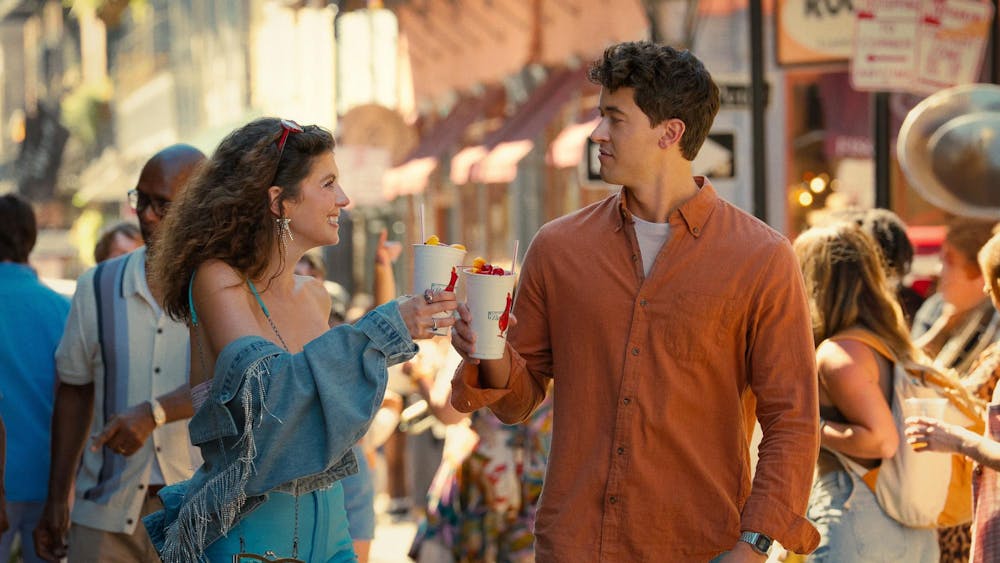Although I am a college student with more than just movies on my mind and no transportation at my fingertips, I had the opportunity to attend the opening weekend of the 36th Chicago International Film Festival, Oct. 5-8. During these four days, I saw 13 movies, shook hands with some of the best directing talent and had a crash course in the world of big league film criticism. The following is my account of this overwhelming celluloid experience.\nOct. 5\nSure I have reviewed films for the IDS for more than three years now, but Bloomington and its Kerasotes monopoly is small peanuts compared to the big shoulders of the Windy City. So, when I stepped into the Cinema Chicago office on the sixth floor of 32 West Randolph at around 9:15 a.m., I was in a whole new universe. \nOther than the unfathomable reality that a festival the size of Chicago's was successfully run out of just one floor of a random office building, I was in general awe of the fact that I was just one step away from the likes of Robert Altman, Joe Dante and a whole slew of other renowned filmmakers whom I would soon be acquainted with.\nThe first true taste I got of the festival was in the Cinema Chicago screening room, which seats about 25 in reclining chairs and a couple of couches off to the left side. The first film to be screened also happened to be the worst I saw at the festival and one of the more despicable pieces of celluloid released this year -- E. Elias Merhige's "Shadow of the Vampire." John Malkovich stars in this fictional account of the making of the silent version of "Nosferatu." \nMalkovich plays director F.W. Murnau with a dry, oftentimes grating attempt at a German accent while Willem Dafoe dons some truly spooky make-up to play Max Schreck, the actor who portrayed Count Orlock/Nosferatu. The script is absolutely abhorrent, with cookie cutter drama more suitable for the small screen and some odd, misplaced humor -- Dafoe catches a bat and gobbles it up in an awkward, over-the-top moment. Dafoe often transcends the stilted script, but this is the only redeeming quality apparent.\nA brief intermission followed this celluloid waste and then the Chinese film "Song of Tibet" was screened. Directed by veteran Xie Fei, this is a lushly photographed, yet overly simplistic story that recalls the younger years of a Tibetan couple. \nThis basically forgettable movie was enhanced by the fact that I witnessed the true diet of film critics. A top critic from Chicago who will remain unnamed ate a fish fillet value meal from McDonald's complete with a McFlurry and two apple pies. How anyone can digest such rubbish while ingesting a film is beyond me.\nAt around 5:30 p.m. I arrived at the Chicago Theatre and geared up to get some photos of the stars that would be on hand for the opening night presentation of "Dr. T & the Women." By the time director Robert Altman arrived at 6:30 p.m., people had crowded around on both sides of the red carpet, yet I still remained in the front line. Mild chaos did not ensue at this time or when Shelley Long arrived. No, it was saved up for the arrival of Richard Gere. While I got many snapshots of all three, I was actually photographed by a Sun Times photographer and appeared in two photos in Friday's edition. And, as if this was not interesting enough, "Dr. T," which happened to be the fifth Altman film to open the festival, was a decent entertainment.\nOct. 6\nThe first full day of festival screenings was under way at 3:30 p.m. at the 600 North Michigan Theatres with the South Korean film "Peppermint Candy." A disarming tale of the destruction of one man's existence, the movie takes a rare narrative turn by beginning with his suicide and then methodically going back in time through pieces of major events in his life. Sol Kyung-Gu, who plays Yongho, gave one of the strongest performances I witnessed in a most powerful social parable.\nWhen this concluded, I was off to the El's Brown Line, which took me to within walking distance of the Music Box Theatre. Here, after sitting through the musings of an organist infatuated with showtunes, the best American film of 2000 (thus far) was shown -- 24-year-old David Gordon Green's "George Washington." \nThe movie follows the existence of a handful of African-American pre-teens in a Southern town during a week or so in the summer. An abandoned amusement park and the local railyard are their playground for youthful philosophical rantings in this sumptuously filmed work by first-timer Green. There is a profundity hidden in the words of these amateur actors, especially Nasia (Candace Evanofski), who proclaims to the title's George (Donald Holden): "I hope you live forever." These are big thoughts for a truly grand work of art that is hopefully the first of many to come from Green. After the film, Green briefly answered questions, which foreshadowed an interview I was to have with him Sunday.\nI finished off Friday with the delightful French excursion "Harry, He's Here to Help." This distinctly Hitchcockian work (as some have said, this could easily be renamed as one of Hitchcock's tales, "The Trouble with Harry") dips into the world of a married bourgeoisie couple, Michel and Claire, who have three daughters and no time for each other. Michel runs into an old schoolmate named Harry who he cannot quite recall and subsequently has a hard time getting out of his life. Eggs, flying monkeys and a well play important roles in this highly entertaining work that is sure to get a decent U.S. release.\nOct. 7\nI began the day in a very wasteful fashion by watching a forgettable film I could not see in the festival on video. The motion picture, Japan's "Sunday's Dream," has many wonderfully framed moments and striking images, especially that of purple strobe lights wandering down a stairwell, but, alas, nothing of substance occurs.\nOne of the more exciting moments of the festival happened when I got the chance to briefly meet director Joe Dante. I shook his hand and told him that I watch "Gremlins" every Christmas with my mother. He seemed proud of this fact and was more than willing to take a photo with me. The rush of energy that resulted from this encounter lasted throughout the insightful documentary "Bus Riders Union," which brings to light the frustrations that many Los Angeles citizens have about the bus system and their resulting actions. \nDirector Haskell Wexler was on hand for a Q and A after the screening. I approached the veteran, award-winning cinematographer and director, shook his hand and asked which he would rather do -- photograph or direct.\n"I like doing everything myself," he said.\nA Metra ride later, I was in University of Chicago territory, where I waited to view the film I was most looking forward to seeing, Taiwanese director Edward Yang's "Yi Yi," at Doc Films. While I waited in the lobby outside the theater, a Renaissance club gathered, decked out in their best costumes. This intriguing distraction aided in alleviating the frustration brought on from the 25-minute delay in the starting of the film. \nThe anticipation and ensuing delay was well worth it because the three hour tale of the innerworkings of a modern Taiwanese family was wholly engrossing on both narrative and visual levels. Yang shows that his best director award at Cannes for this work was fully earned with the immaculate framing and depth of each shot, including striking moments involving the reflections of a city's night lights drowning out the figure of the main female character. And the film's 8-year-old boy character, aptly named Yang Yang, captures the sprit of the human condition with his insights and photographic artistry. \n"Yi Yi" was certainly the best film I saw during the weekend. And when I exited this visually and emotionally powerful piece of celluloid, I encountered an equally riveting sight -- snow pellets cascading to the ground backed by lightning cracks and a chorus of thunder. This goes to show how crazy and wondrous Chicago can be in October.\nOct. 8\nThis final day of my excursion brought me to an 11 a.m. interview with David Gordon Green in the Hilton Garden Inn's Hospitality Suite. We discussed many varying aspects of his cinematic life, from the fact that he believes he is the first ever Blockbuster Video customer to his influences, which include Terrence Malick, Carroll Ballard and Michael Ritchie. Green also said after the audience finishes "George Washington," he "wants them to take a walk."\nFollowing this chat, I took in four films. \nFirst on my plate was first-time Iranian director Marzieh Meshkini's "The Day I Became a Woman." Scripted by her husband, acclaimed filmmaker Moshen Makhmalbaf, this gorgeously haunting work tells three separate stories about female oppression in Iran. The first deals with a girl who is only hours away from her ninth birthday, the day she becomes a woman, and how she spends it. The second and most resounding of the three tells of a woman who has left the responsibilities of her home life to be on her own in a bike race, only to find her husband and company galloping about on horses to take her back. The final story, which shows an old woman who finally can buy the items she has always wanted, ends with the most haunting images of the festival: furniture floating out to sea, as seen though the eyes of the girl of the first story.\nAfter this, I saw Agnes Varda's thoroughly enjoyable documentary "The Gleaners and I." Beginning with the idea of finding out if gleaning still takes place on a large scale level, she travels about the French countryside discovering interesting people and funny facts about her own filmmaking process, as is evidenced in one sequence when her lens cap dangles about in the image. One of the lasting moments of the whole festival weekend occurs when Varda discovers some heart-shaped potatoes. During the Q and A that proceeded the screening, the aging, yet glowing Varda cited this moment as the point when she realized that the movie had life because of the fact that she could find such beauty among the garbage of gleaning.\nThe third and fourth films were Iranian -- Bahman Ghobadi's harrowing "A Time for Drunken Horses" and Hassan Yektapanah's flawed "Djomeh." "A Time for Drunken Horses" depicts the impoverished lives of a family of teenagers who must survive as adults in the icy realm of Iranian Kurdistan. Although only 16, the lead actor who portrays Ayoub gives a heart-wrenching performance in this co-winner of best first feature at Cannes, which it shared with "Djomeh." \nAt times, the gripping realism coupled with the sparse dialogue, with only the stomping of hooves against snow acting as the lone item on the soundtrack, makes this one of the year's finest films. \n"Djomeh" focused its sights on the alienation Afghanis face in Iran with the story of an immigrant Afghan dairy farmer who falls in love with an Iranian woman. Yektapanah cites Abbas Kiarostami as a major influence, which often shows in "Djomeh's" slow-pacing and overall naturalism.\nBut unfortunately, "Djomeh" is ineffective in allowing the viewer to get past the character's carapaces and into their inner-workings, which is where it seems the film's answers would lie.\nI began with the worst of the worst and ended with three films from one of the great contemporary cinema centers -- Iran. This was a fabulous experience that I can only hope to repeat next year.
A journal of a film festival
Get stories like this in your inbox
Subscribe





